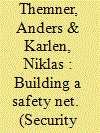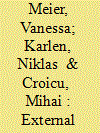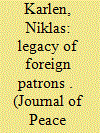| Srl | Item |
| 1 |
ID:
171985


|
|
|
|
|
| Summary/Abstract |
The disarmament, demobilization, and reintegration of ex-combatants has become an integral part of peacebuilding. Although the main purpose of such interventions is to dissolve the military structures of armed groups, there is growing evidence that ex-combatant networks often remain intact. We investigate why such structures continue to thrive. We argue that ex-military networks are stronger when ex-commanders have weak links to elite patronage systems. Ex-combatants who are unable to rely on their former superiors for economic assistance must instead build denser ties to each other to gain access to a social safety net. To assess our argument, we conduct a comparative social network analysis (SNA) of two ex-military networks in Liberia. This innovative approach helps us uncover previously overlooked, but central, dynamics related to ex-combatant groups. We thereby show that SNA provides a range of underutilized tools and exact definitions that can increase our understanding of ex-military networks.
|
|
|
|
|
|
|
|
|
|
|
|
|
|
|
|
| 2 |
ID:
190888


|
|
|
|
|
| Summary/Abstract |
In this article, we present the most up-to-date, fine-grained, global dataset on external support in armed conflicts: the UCDP External Support Dataset (ESD). The dataset encompasses data on states and non-state actors as both supporters and recipients and provides detailed information on the type of support provided to warring parties in armed conflicts between 1975 and 2017. We use it to highlight three broader trends in the provision of external support: (1) a dramatic increase in the number of external supporters, (2) a larger share of pro-government interventions, and (3) the rise of direct military intervention as the predominant mode of external support. In conclusion, we identify several avenues worthy of future inquiry that could significantly improve our understanding of external support in armed conflicts.
|
|
|
|
|
|
|
|
|
|
|
|
|
|
|
|
| 3 |
ID:
154845


|
|
|
|
|
| Summary/Abstract |
Why do some armed conflicts that have ended experience renewed fighting while others do not? Previous research on conflict recurrence has approached this question by looking at domestic factors such as how the war was fought, how it ended or factors associated with its aftermath. With the exception of the literature on third-party security guarantees, the influence of outside actors has often been overlooked. This article explores the role of external states and suggests when and how their involvement is likely to affect the probability of renewed warfare. The main argument is that the legacy of outside support creates an external support structure that affects the previous combatants’ willingness as well as their opportunities to remobilize. This means that armed conflicts with external state support will experience a greater likelihood of recurrence compared to other conflicts which did not see external support. The theory is tested using Cox proportional hazards models on global data of intrastate armed conflicts 1975–2009. The findings suggest that external support to rebels increases the risk of conflict recurrence in the short term as groups receive or anticipate renewed assistance. The results also indicate that it is more important for rebel groups to have had enduring support over the years in the previous conflict rather than access to multiple state sponsors. External support provided to governments is not associated with conflict recurrence.
|
|
|
|
|
|
|
|
|
|
|
|
|
|
|
|